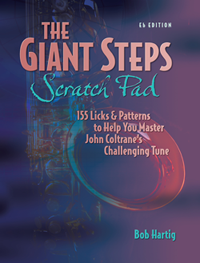There is an art to pursuing the things we’re most passionate about without letting them consume us. I certainly find this to be true of my own two interests, jazz saxophone and storm chasing, but the principle applies to all of us in whatever our preoccupations may be. Without fascination, energy, focus, and joy to drive us wholeheartedly in our pursuits, there’s no point to them; yet without restraint, self-awareness, and awareness of the broader world around us, it is easy to become a mile deep in our passions and an inch deep in life at large. Between these two realities, for me and I think for many of us, there lies a dynamic tension.
As a disciple of Jesus, I have to reckon with the issue of idolatry. In Old Testament times, an idol was easy to identify. It’s hard for us today to fathom people fashioning gold calves and graven images, both human and bestial, and then worshiping the things that they themselves had crafted. Yet that’s exactly what people did back then, both in pagan nations and in apostate Israel.
The funny thing is, we’re no different. We still bow down to the works of our hands, to things that are capable of becoming our gods if we let them. Things that blind us to truths bigger than ourselves and hinder our capacity to love God and others.
The problem with our modern idols, however, is that they’re not readily identifiable as such in the same manner as, say, a brazen bull or a figurine of Marduk. Anything in our lives can become an idol–our careers, our pursuits, significant relationships, the desire for love, our injuries and disappointments, our causes, our appetites, our emotions, our cars and other possessions, even our ministries and charitable occupations. Idolatry today is not usually something that is innate to the things in our lives, but is a matter of our attitude toward them and God. In ways subtle and not so subtle, it’s easy for us to invest ourselves in what we have and what we do in such a way that we allow it to define life and purpose for us. That’s a problem, because any of it can be taken away from us at any time, and sooner or later all of it is going to go. Then where do we find meaning; then where do we find life?
Moreover, we can become irresponsible and selfish in reaching for what we’ve defined as life, setting our pursuits above people we love and who love us. When we’re frustrated in those pursuits, we can become downright nasty, even destructive, toward persons who seem to inconvenience us, challenge us, or obstruct us. We’ll sacrifice others to our idols and justify ourselves in doing so rather than deal with our own hearts.
All this in the quest for life on our own terms.
Well do the words of Isaiah the prophet speak to us today: “[The idolater] feeds on ashes; a deluded heart misleads him. He cannot save himself or say, ‘Is not this thing in my right hand a lie?'”
Is there a flip side to this coin?
Of course there is. If God never intended for us to enshrine the things that we enjoy and love to do, neither does he want us to smother those things in sackcloth. In the Bible’s book of Genesis, in the Creation story, God from the beginning gave Adam and Eve something meaningful to do. They were gardeners, caring for the trees and flowers in Eden. Ironically, after they sinned, the man and woman’s immediate response was to hide from God behind the very things he had assigned them to cultivate and protect.
The problem lay not in the shrubs and trees and vines, but in Adam and Eve. The greenery in the garden was the same as the day when God first looked on it and called it good; it was the human heart that had changed. Ever since, in various ways, we’ve had a tendency to conceal ourselves from God and from each other behind the things we do.
Yet those same pursuits also have the potential to express the robust life of Jesus living in us untamed and unfettered. There’s nothing at all winsome about Christians who are so paranoid about idolatry that everything they do is constrained by a gray, lackluster religiosity. Many well-meaning believers confuse holiness with a boxed-in, sanctimonious, hermetically sealed existence that is about as invigorating as paper pulp. It hardly mirrors God’s exuberance in the act of creation, when with a decisive word he spun the visions of his heart into being–planets, suns, galaxies, luminous gas clouds, multiplied quintillions of celestial objects, all whirling across the velvet-black vastness; ocean tides pulsing and surf crashing against craggy shorelines; wildflowers waving in vivid, multi-hued pointillism in meadows and forests, knit together, unseen, by untold millions of miles of subterranean roots and rootlets.
Talk about a hobby! It was no dour, stuff-shirted God who created this fabulous world around us, this universe that awes and fascinates and humbles us; no, it was an eternal being who throughout the ages remains forever young–smarter than the most brilliant scientist, wiser than the wisest sage, yet passionately, perpetually, and unapologetically a child at heart.
God created us to live our lives as wholeheartedly, creatively, lovingly, generously, fearlessly, and beautifully as he lives his, in ways unique to each of us. Failure to do so is in itself a form of idolatry, a lack of trust that the One who hardwired us with our personal interests also supplies the grace and wisdom to express his life and fulfill his intentions through those interests.
The overarching principle is love–love of God and love of others. Love is ultimately what separates between idolatry–which is about pursuing our own independent way on our own terms–and the abundant, God-dependent life that Jesus offers. Christianity is not about good morals and rock-hard dogma; it is about nothing less than the life of Jesus himself living inside us, energizing us, guiding us in the pathway of his character. That is no weak, wan way of living. To be sure, it is a way that is often marked by self-sacrifice, pain, loneliness, misunderstanding, prayer, struggle, and self-control. But it is also a way infused with immense purpose, remarkable potential, endless fascination, and a joy that can be found in nothing else this life can offer.
In conclusion
Bringing all of the above to bear in a practical way for those of us who chase storms and/or play music: Whatever you do, do it with all your heart. God is not glorified by a timorous approach to the things you enjoy, nor does he want you to walk on eggshells for fear of offending him. Just keep in mind that there is more to life than your pursuits. Enjoy those pursuits, treasure them, but don’t grasp them so tightly that you can’t let go, and don’t let them give you tunnel vision so that you fail to see and participate in the broadness of life around you. Other people’s worlds are as rich and important as yours; to the best of your ability, enter into them, celebrate them, and let them expand you. Harness your interests in a way that makes your life bigger, not smaller–an expression of generosity, not selfishness, and of a Christlike perspective that values God and others most of all.
Behind the sound of a saxophone playing now tenderly, now exuberantly, always striving for creativity and beauty…behind the sublimity, the fascination, and the awe of a tornado churning across the open prairie…you can, if you choose, hear the song and see the face of God. If you submit your heart to him, he will in turn release his own magnificent heart in and through the things you love to do.
This, in part, is what life, true life, is about: allowing the things that are central to us to become the servants and the expressions of Someone far bigger than ourselves, and of a kingdom greater than our own.

